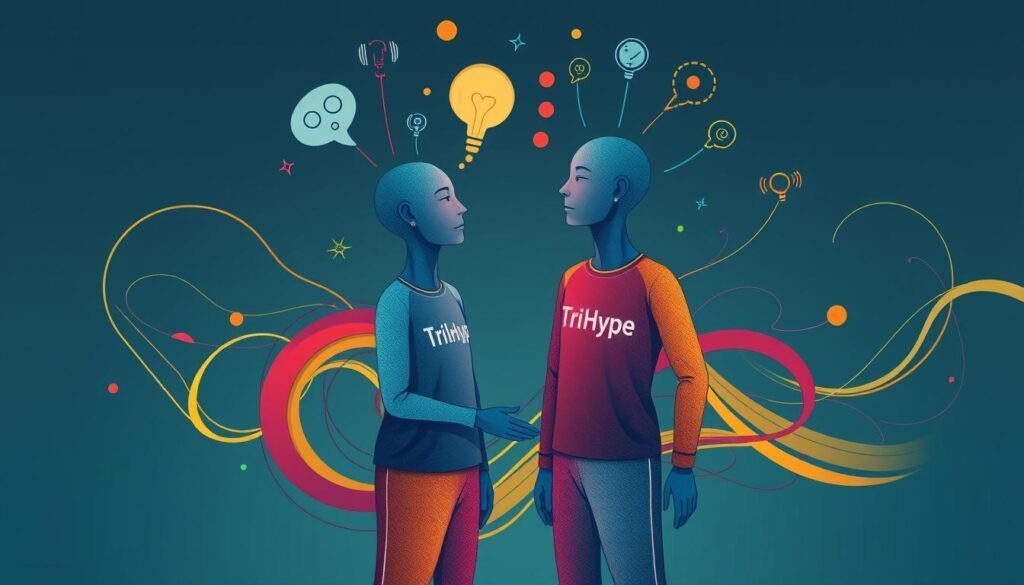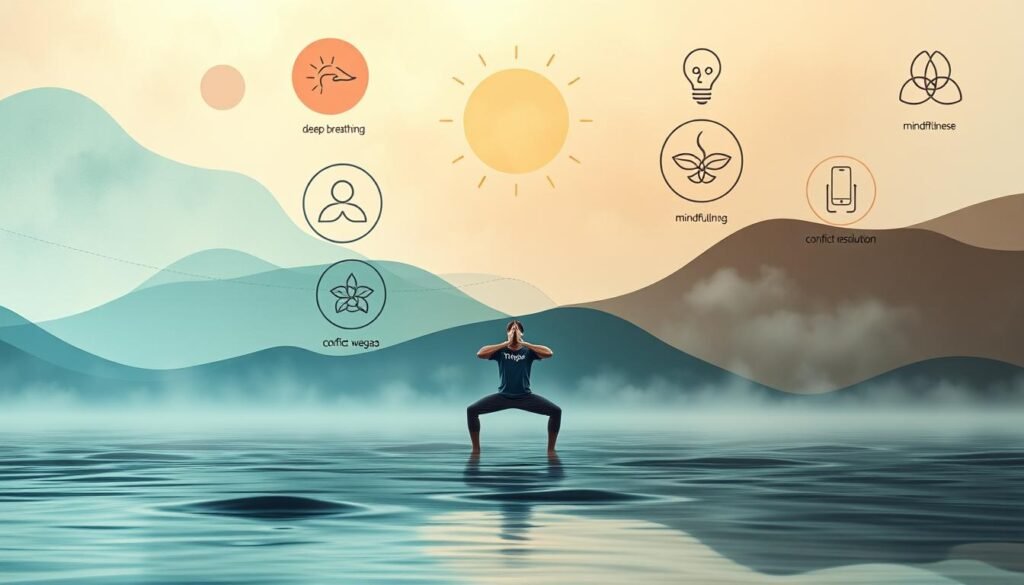Maya Angelou once said, “I’ve learned that people will forget what you said, people will forget what you did, but people will never forget how you made them feel.” This quote highlights how crucial it is to handle conflicts well in our relationships. We’ll dive into strategies for solving conflicts in your relationship. If you often argue, have unresolved issues, or struggle with communication, we’ve got you covered. We’ll give you the tools and techniques to overcome these hurdles and make your relationship stronger. Learning how to resolve conflicts can lead to a more peaceful, rewarding, and lasting relationship. now How to handle relationship conflicts? is what we are going to answer today.
Key Takeaways
- Understand the common sources and impact of relationship conflicts.
- Develop effective communication skills for conflict resolution.
- Leverage emotional intelligence to manage conflicts constructively.
- Discover strategies for compromise and finding common ground.
- Learn when to seek professional help, such as counseling or couples therapy.
Understanding the Nature of Relationship Conflicts
Every relationship faces conflicts, as no two people see things the same way. It’s key to know what causes these conflicts and how they can affect us. This knowledge helps in solving these issues.
Common Sources of Conflicts
Conflicts can come from many things like different values, expectations, and ways of talking. Disagreements on big life choices, like money, jobs, or having kids, can lead to bigger issues. Not being able to talk well and not sharing what you need can also cause ongoing problems.
The Impact of Unresolved Conflicts
Ignoring conflicts can hurt a relationship a lot. It can break trust, hurt emotional closeness, and make people feel mad, resentful, and distant. In the worst cases, it might even end the relationship. Emotional intelligence is very important here. Being able to handle your feelings can really help solve conflicts.

Knowing what causes conflicts and their effects helps people deal with them better. By tackling these issues together, couples can make their relationship stronger.
Effective Communication Skills for Conflict Resolution
Good communication is key to solving conflicts in relationships. By improving skills like active listening, empathy, and clear expression, we can handle conflicts better. This leads to solutions that everyone can agree on.
Active listening is a top skill for solving conflicts. It means really paying attention to what the other person says, understanding their view, and caring about their worries. This builds trust and helps talks go smoothly.
Empathy is also crucial. It means trying to see things from the other person’s point of view and understand their feelings and reasons. This can calm things down and help everyone work together better.
Being able to share our thoughts and feelings clearly is important too. Using “I” statements helps us share our views without blaming others. This makes it easier for the other person to open up and share their thoughts honestly.
With these skills, dealing with relationship conflicts gets easier. We can find solutions that work for everyone. Learning these skills is the first step to solving conflicts well.

“Effective communication is the foundation of successful conflict resolution. By listening actively, showing empathy, and expressing ourselves clearly, we can find common ground and resolve disputes in a constructive manner.”
How to Handle Relationship Conflicts: Proven Strategies
Dealing with relationship conflicts can feel tough, but the right strategies can make couples stronger. Focusing on active listening and empathy is key. By really getting what our partner feels and needs, we can find ways to solve problems together.
Active Listening and Empathy
Active listening means more than just hearing words. It’s about really focusing on our partner’s feelings and experiences. Empathy, or understanding their feelings, helps us respond with kindness and care.
Identifying the Root Causes
Fixing conflicts starts with finding out what’s really causing them. We should look beyond the surface-level arguments. This might mean looking into past issues, unmet needs, or how we communicate that’s causing trouble.
Using these strategies can help us handle conflicts better. We can work through tough times with empathy and a real wish to find solutions that help both of us. Listening, empathizing, and tackling the deep causes of conflicts can lead to a better relationship.

“The greatest weapon against stress is our ability to choose one thought over another.” – William James
Emotional Intelligence in Conflict Management
Dealing with relationship conflicts needs a deep grasp of emotional intelligence. This means knowing how to handle our feelings and understand others’. It’s key to solving conflicts well. By improving these skills, we can tackle disagreements better.
Recognizing and Regulating Emotions
First, we must know our own feelings during conflicts. It’s easy to feel angry, frustrated, or hurt in arguments. But, by recognizing these feelings, we can calm down and avoid making things worse.
Managing our feelings helps us not to react too quickly. We can use deep breathing, mindfulness, and thinking things over. This way, we talk about conflicts with a calm and caring attitude, leading to better solutions.
| Emotional Intelligence Skills | Benefits for Conflict Management |
|---|---|
| Self-awareness | Ability to recognize and understand our own emotions |
| Self-regulation | Capacity to control and manage our emotional responses |
| Empathy | Skill to understand and share the feelings of our partner |
| Social skills | Competence in communicating and collaborating effectively |
By growing these emotional skills, we can handle conflicts better. We become more aware of ourselves, more caring towards others, and in control of our feelings. This leads to better and more positive results.
The Art of Compromise and Finding Common Ground
Compromise is key in solving relationship conflicts and making bonds stronger. By finding common ground, partners can meet each other’s needs and concerns. This leads to solutions that benefit both sides. We’ll look into how to compromise and find strategies for working together better.
At the core of compromise is understanding our partner’s view. We need to listen, get their concerns, and respect their points. This helps build trust and respect, making it easier to talk things out.
One good way is to look for common interests instead of focusing on what divides us. By doing this, we might find solutions that work for everyone. It takes being flexible and open to new ideas.
- Identify shared goals and values that can serve as a foundation for compromise.
- Communicate openly and honestly, expressing your needs and concerns without judgment.
- Engage in active listening, striving to understand your partner’s perspective before proposing solutions.
- Be willing to compromise, finding a middle ground that accommodates both individuals’ needs.
Remember, compromise isn’t about winning or losing. It’s about moving forward together and growing as a couple. By using this approach, we can handle conflicts with empathy and creativity. This helps us build a stronger, more united future.

“Compromise is the best and cheapest lawyer.”
– Robert Louis Stevenson
Seeking Professional Help: Counseling and Couples Therapy
Relationships can be complex and sometimes need help from professionals. If you and your partner keep facing big problems, getting help from a therapist or counselor can be a big step. We’ll look at how counseling and couples therapy can help solve relationship issues. We’ll also talk about when it’s a good idea to get professional help.
When to Consider Professional Intervention
There are times when getting help from a counselor or couples therapist is a good idea. If you and your partner keep arguing and can’t work things out, it might be time to seek help. If big changes in life, like losing someone close, money problems, or cheating, are making things tough, a therapist can offer support and tools to help you.
- Persistent, unresolved conflicts in the relationship
- Frequent communication breakdowns or an inability to effectively communicate
- Difficulty in finding common ground or compromising on important issues
- Major life events or transitions that are straining the relationship
- Concerns about the overall health and well-being of the relationship
By getting help from a counselor or couples therapist, you and your partner can figure out what’s causing your problems. You can learn better ways to talk to each other and handle tough times together.

“Seeking professional help is a sign of strength, not weakness. It takes courage to acknowledge that you need support and guidance to strengthen your relationship.”
Anger Management Techniques for Healthy Conflict Resolution
Dealing with conflicts in a relationship can be tough. But, with the right anger management techniques, you and your partner can handle disagreements better. Anger can quickly make things worse if not managed. We’ll look at strategies to help you both stay calm and communicate well during conflicts.
Breathe and Pause
When things get heated, it’s key to step back and breathe deeply. Inhale slowly through your nose, hold it, and then exhale through your mouth. This can help you calm down and stop reacting impulsively.
Use “I” Statements
Instead of blaming with “you” statements, use “I” statements to share your feelings. This way, you avoid making your partner defensive and encourage them to listen to you. For instance, say “I feel ignored when you don’t call me” instead of “You never listen to me.”
| Anger Management Techniques | Benefits |
|---|---|
| Mindfulness and Meditation | Cultivates self-awareness and emotional regulation |
| Physical Activity | Releases tension and provides a healthy outlet for anger |
| Cognitive Reframing | Helps to challenge negative thought patterns and shift perspectives |
It’s important to tackle conflicts with empathy and a desire to understand each other. By using anger management techniques, you and your partner can work through tough times together. This can actually make your relationship stronger.
“The greatest weapon against stress is our ability to choose one thought over another.” – William James

Establishing Healthy Boundaries in Relationships
Healthy boundaries are key to strong, happy relationships. They set clear limits on what we’re okay with. This keeps our emotional, physical, and mental health safe. It’s vital for all kinds of relationships, like romantic ones or work partnerships.
Setting Boundaries and Respecting Boundaries
Setting healthy boundaries in relationships means telling others what we need and want. This could be about how much time we spend together, how we touch, what we talk about, or how we handle money. It’s also crucial to respect others’ boundaries to build trust and understanding.
When we set and respect boundaries, everyone feels safe and heard. This leads to happier, more balanced relationships. But ignoring or crossing boundaries can cause resentment and hurt feelings, leading to relationship problems.
| Healthy Boundaries | Unhealthy Boundaries |
|---|---|
| Clearly communicated needs and limits | Vague or non-existent boundaries |
| Mutual respect and understanding | Disregard for personal space and privacy |
| Balanced give-and-take | Codependent or controlling behaviors |
| Feeling safe, heard, and valued | Feelings of resentment and emotional turmoil |
Creating and keeping healthy boundaries in relationships takes effort. We need to know ourselves, talk openly, and be ready to adjust as we grow together. By focusing on this, we can build lasting, joyful connections with those we care about.
“The root of suffering is attachment. And the root of that attachment is the inability to set and maintain healthy boundaries.” – Debbie Ford
The Role of Forgiveness and Reconciliation
Forgiveness and reconciliation are key in fixing relationship issues. When couples fight, letting go of past wrongs and rebuilding trust is vital. This helps keep their relationship strong and stable.
Forgiveness starts the healing process. It means acknowledging the hurt and choosing to move on. This is hard because it involves dealing with anger, hurt, and betrayal. But, choosing to forgive can lead to healing and a stronger relationship.
Reconciliation is about fixing and strengthening the relationship after a fight or trust issue. Both partners work to rebuild trust, communication, and understanding. It takes patience, empathy, and a commitment to the relationship.
By following forgiveness and reconciliation, couples can overcome conflicts and feel closer. It shows how strong love can change people and relationships.
“Forgiveness is not an occasional act, it is a constant attitude.” – Martin Luther King Jr.
The path to fixing relationship issues is about understanding, empathy, and moving past the past. Forgiveness and reconciliation help couples turn tough times into chances for growth. This strengthens their bond.
Preventing Future Conflicts: Proactive Strategies
It’s key to tackle conflicts as they happen, but also to stop them before they start. By taking steps ahead of time, we can make our relationships stronger and more peaceful. This means talking openly and understanding each other better.
Fostering Open Communication
Talking openly is vital for a strong relationship. Couples should make time for honest talks where everyone feels heard. This helps to clear up any misunderstandings before they turn into big problems.
- Schedule regular check-in meetings to discuss relationship concerns openly and without judgment.
- Actively listen to your partner’s perspective, seeking to understand rather than defend.
- Establish clear guidelines for resolving disagreements, such as taking breaks or seeking mediation when needed.
By talking openly, we can stop problems before they get worse. This helps keep our relationships strong and free from future conflicts.
| Proactive Strategy | Benefits |
|---|---|
| Establishing Regular Check-In Meetings | Provides a structured, uninterrupted environment for addressing concerns and finding solutions. |
| Practicing Active Listening | Fosters empathy, understanding, and the ability to find common ground. |
| Setting Clear Conflict Resolution Guidelines | Ensures a productive and cooperative approach to managing disagreements. |
Using these strategies, we can build a healthier relationship. This reduces the chance of future conflicts and helps us stay together longer.
Case Studies: Real-Life Examples of Conflict Resolution
We’ll share real-life case studies to show how to solve conflicts in relationships. These examples will give you insights and inspiration. They prove that the strategies we talk about work in real life too.
Sarah and Michael, a long-term couple, had fights over money and chores. They talked openly and honestly to find out why they were fighting. They learned to listen, understand each other, and make compromises. This helped them live more peacefully together.
Alex and Jamie, a newlywed couple, had issues blending their families. They had different ways of parenting and struggled with boundaries with their exes. They got counseling and learned to manage anger and set boundaries. This helped them grow closer as a couple.
These stories show how solving conflicts can improve relationships. By facing problems, growing emotionally, and compromising, people and couples can overcome challenges. This leads to stronger, happier relationships.
Conclusion
We’ve looked at how to handle relationship conflicts in this guide. We’ve talked about the power of effective communication, emotional intelligence, and compromise. These tools help you deal with conflicts in a good way and make your relationships stronger.
We also talked about the importance of seeking professional help when you need it. Counseling and couples therapy can offer special advice and support during tough times. We also covered how anger management and healthy boundaries are key for a better relationship.
Looking back at the key takeaways from this article, we suggest you focus on forgiveness and making up. Also, try to stop conflicts before they start by talking openly and understanding each other better. With these skills, you’ll be ready to face any challenges in your relationships with confidence and strength.
